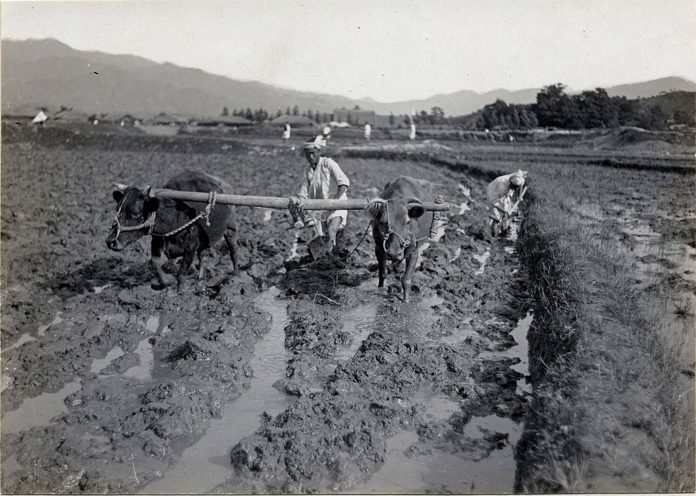Continuous cold and wet weather — the bane of farmers everywhere! This year has been bad in Ohio, where I live, and elsewhere as well.
The May 13 USDA Crop Progress Report put Ohio corn planted at just 4%, while on the same date last year the total was 50%.
Indiana and Michigan aren’t far ahead with just 6% and 5%, respectively. I’m certainly not a “global warming” naysayer; I’m sure that greenhouse gas emissions are damaging the atmosphere and will cause huge problems for humans in the future.
However, nasty weather patterns have occurred in the past.
One such miserable year, especially in Europe, was 1879. The winter had been unusually cold and snowy, April and May much colder than normal and the summer the wettest, and one of the seven coldest in the long record-keeping history of England.
Then it was cold all through the fall, followed by another bitter winter. One English writer concluded that 1879 was A year of two winters and no spring or summer, while another said, The winter left late and returned early.
Other comments from different parts of England include,
• Apples and pears about one-fourth of an ordinary crop, many vegetables such as tomatoes and marrows would not ripen at all; potatoes nearly all rotted.
• Year remarkable for the great absence of sunshine; there was only 92 days on which the sun shone for more than two hours.
• Snow fell in eight months; vegetation much retarded by cold.
• Corn crops, hay and fruit all very bad.
• Cloudy and sunless in a remarkable degree, with a low mean temperature; vegetation weak, fruits small and deficient in flavour.
• Snow on the ground from November 20th to December 27th.
• Wretchedly wet and gloomy….nothing ripened.
• The rainfall in June, July and August is the heaviest I have known for 50 years and the year was the most unfavourable for all agricultural operations that I have known during that period.
Grain And Chaff From An English Manor
In an excellent book on late 19th century British farming called Grain And Chaff From An English Manor, published in 1920 by Arthur H. Savory in which he describes his experiences running a 300-acre farm in Worcestershire south of Birmingham, he tells of that terrible year.
Savory wrote, In the summer of 1879 one of these sudden floods occurred, and people standing on Evesham bridge, saw fallen trees and hay-cocks floating down the stream. A pollard willow was noticed with a crew of about twenty land rats, which had found refuge there until the tree itself was lifted by the rising water and carried down the stream; and a floating hay-cock supported a man’s jacket, his jar of cider, and his “shuppick.”
The local word “shuppick,” a corruption of “sheaf-pike,” means a pike used for loading the sheaves of wheat in the harvest field on to the waggon, and is the “fork” in general use at hay-making.”
He also tells us, During the wet harvest of 1879, when what was called by townspeople the agricultural depression, was becoming acute, it was impossible to get a whole day on which wheat could be carried. The position was serious, because the grain was sprouting in the sheaves in the field, and time after time a fairly dry Saturday would have allowed carrying the following day, though Monday was always as wet as ever.
At last at Aldington we faced the situation and decided to proceed with the work whenever possible, Sunday or no Sunday. A fine drying Saturday occurred, and my bailiff [foreman] told the men what we proposed, adding that we did not wish anyone to help who had scruples as to the day. They all appeared on Sunday morning, a brilliant day, except one “conscientious objector,” who, as I heard later, spent most of the day at the public-house. We got up two ricks from about ten acres, which eventually proved to be some of the driest wheat we had that year, and which I was able to sell for seed at a good price, to go into districts where no dry seed wheat could be found.
My old vicar was somewhat scandalized at this Sunday work, and some of my neighbours fancied themselves shocked, but a day or two later I happened to meet another clergyman friend, who farmed a little himself. “I was so pleased,” he said, ‘to hear that you were carrying wheat last Sunday; when I was preaching I was strongly disposed to conclude by telling my people—’Now you have been to church, go home to your dinners, and then off with your jackets and carry wheat for the rest of the day.’ Next Sunday all my neighbours were busy with their wheat, but I had managed to complete my harvest during the previous week, on the 8th of October, quite a month or six weeks later than usual, and an extraordinary contrast to the very dry year 1868, when all the corn on the farm was carried before the last day of July.”
Unknown authors
The following verse was written in a Bala, Gwynedd, Wales, hotel register by an unknown author during that unusually wet British summer.
The weather depends on the moon, as a rule,
And I’ve found that the saying is true;
For at Bala it rains when the moon’s at the full,
And it rains when the moon’s at the new.
When the moon’s at the quarter, then down comes the rain;
At the half it’s no better I ween;
When the moon’s at three-quarters it’s at it again,
And it rains besides in between.
The situation was later summed up by another unknown author: In 1879 farmers lived on faith, in 1880 they are living on hope, and in 1881 they will have to live on charity.
So I reckon today’s farmers, stressed out by the weather, low grain prices, and the political maneuvering that’s depressing world markets, will have to rely on faith and hope, and pray that they won’t soon need charity.












